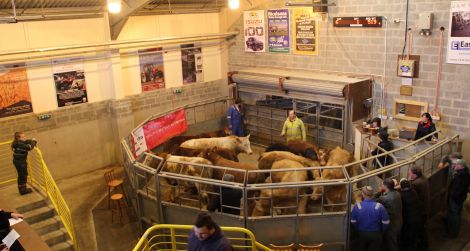News / Farmers urge council to buy local food
THE LOCAL farming community has received backing from politicians and national industry leaders in its campaign to encourage Shetland Islands Council and NHS Shetland to procure more local produce.
Shetland Livestock Marketing Group (SLMG) and the Shetland Abattoir Co-operative have produced a resilience review and are hosting a meeting on Thursday afternoon to discuss the threats and opportunities the local industry is facing.
With the uncertainties of Brexit heavy on farmers’ minds, the industry is challenging the local authority’s procurement principles in the hope that they can supply schools, hospitals and care homes with more local produce.
SLMG chairman Ronnie Eunson said that if the SIC and the health board would commit to buy locally, the islands’ agriculture sector would rise to challenge and produce what is required.
But an SIC spokeswoman said national procurement rules were complex and did not allow the council to favour local suppliers.
“Depending on seasonality, the council will source as much fresh produce as possible locally through its supplier. All fish used and the majority of lamb originates from Shetland, along with potatoes and vegetables in season,” she said.
“The council has a responsibility to source good quality produce for the benefit of our care homes and schools.
“The benefit of sourcing from local markets is acknowledged, but it is essential that the council abides by the complex procurement legislation as well as achieving best value.”
Neighbouring Orkney Islands Council has meanwhile provided details of its contracts with local companies to supply schools and care homes.
An OIC spokeswoman said: “A contract for meat supplies is in place with a local butcher, with beef, lamb and pork locally sourced (chicken is not locally available in the volumes required within Orkney, but is still sourced through a local butcher).
“A contract for fruit and vegetables is in place with a local wholesaler.”
Become a member of Shetland News
The overall value of meat and vegetables procured locally in Orkney and used by the local authority is in the region of £856,000, the spokeswoman added.
She said there were no issues with seasonability and consistency of supply “as all products are normally available”.
This week the SIC published tendering documents for a £200,000-a-year contract to supply and deliver butcher meats.
Eunson said the pre-requirement of a bank reference of at least £200,000 would reduce the chances of SLMG tendering for the contract “to nil”.
He said the council’s procurement rules were outdated as they did not include the government’s own “sustainability procurement strategy” developed by Robin Gourley, who is well known in the industry for his work on “localising food chains for schools”.
Thursday’s meeting would be looking at the strengths and weaknesses of the co-operative as well as any potential areas for development, he said.
“We would invite a discussion to take place with the SIC and NHS to facilitate more healthy and nutritious local produced food going into these contracts.
“What is needed is a commitment by agencies not to rely on imported foods but to commit to sourcing as much as possible locally.”
On a visit to the islands this week, newly-elected Highland and Islands Conservative MSP Jamie Halcro Johnston said there should be a presumption in favour of local produce.
“It’s probably not as easy as just saying everything has to come from local sources, but I think there should be a presumption to look at local sources first, particularly when there’s so much good produce available in Shetland,” he said.
“It supports local businesses, brings money into the local economy, it reduces food miles and it means a sustainable rural economy.”
NFU Scotland vice-president Gary Mitchell, who visited the largest agricultural show on the Shetland calendar at Cunningsburgh on Wednesday, went one step further and said he would like to see local produce become mandatory.
“I have a lot of concern. I visited Shetland Farm Dairies on Monday. It’s quite horrifying in a way that only 40 per cent of the milk [in Shetland] is supplied by Shetland farmers,” he said.
“To me, there’s a great opportunity there. Why can’t that be 100 per cent? I think that should be mandatory. In places like Shetland, everybody should be drinking Shetland milk.”
Become a member of Shetland News
Shetland News is asking its readers to consider paying for membership to get additional perks:
- Removal of third-party ads;
- Bookmark posts to read later;
- Exclusive curated weekly newsletter;
- Hide membership messages;
- Comments open for discussion.
If you appreciate what we do and feel strongly about impartial local journalism, then please become a member of Shetland News by either making a single payment, or setting up a monthly, quarterly or yearly subscription.






























































